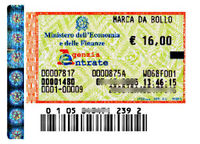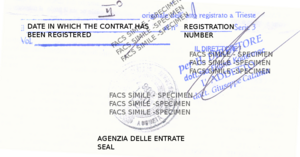House rental contract
A legal rent contract has to be registered within a month since you've signed it with the agenzia delle entrate (the Italian tax office) and should bear at least one marca da bollo (like the one you have brought your first day in SISSA) every 4 pages (contracts usually require one - one and a half pages). Every contract should contain some info in order to be properly written (and hence to be valid).
Contracts
There are a lot of different kinds of contracts. The most common is the standard rent contract in Italy and lasts for 3 years at minimum (with an option for a 2 year renewal) . As PhD students we are entitled to sign a student rent contract (locazione agevolata per studenti) which can last as short as six months (up to a maximum of 36 months).
Sharing
You can also share a house with some other students. In this case there are two possible situations: either you and your flat mates sign altogether the contract or you can join an existing contract. In either case you'll have, at the end, the document you need in order to get SISSA rent reimbursement.
- In the first case (signing altogether) you have only to pay attention that every flatmate is indicated in the contract as tenant (conduttore)
- In the second case (joining another contract) you have to sign a separate contract (that should be signed by all the other tenants apart from the landlord) called variazione di contratto di locazione in which the landlord declares that the original contract (the one you are joining) applies also to you. Bear in mind that also this variazione should be registered to be legal.
There is also a third possibility called sub-rent or subaffitto. However this option isn't very safe as the standard rent contract in Italy explicitly forbids to sub rent and, even if you could sub rent, this could endanger (for some complicated tax related reasons) your fellowship.
Requirements
In order to sign a legal rent contract you should have an ID document (either passport or ID card), the permit of stay (or the recipe that you'll get upon submitting your application) and your codice fiscale.
In every contract (usually at the beginning) the following data have to be included for each tenant and for the landlord:
- Name and Surname
- Date and place of birth
- Place of residency (your home address)
- Kind of ID document, number, authority that issued it, date in which it was issued
- Codice fiscale
At the end of the contract after the date you should sign (bear in mind that a legal signature in Italy is composed by name and surname).
Renewal
Usually contracts are automatically renewed BUT you and your landlord will have to pay the renewal registration tax and make sure that you'll have a copy of the payment receipt as you'll have to show it to SISSA in order to get the contribution towards living expenses.
How to terminate
A legal contract can be terminated before its stipulated expiring term by the tenant (recesso del conduttore). The tenat should write a letter to the landlord and should ask for a return receipt (raccomandata con ricevuta di ritorno ).
Usually the contract itself provides for this right but requires the tenant to send the letter some (normally 6 but for students contract can be as short as 1 month) months in advance of his planned leave. Only if the landlord accepts (by mean of a written statement) a minor term the tenant can legally terminate the contract (and the payments) earlier.
Expenses
When signing a contract you should pay the marca da bollo and half of the registration expenses (2% of the rent cost per year, these are due every year but can be paid altogether for the entire period covered by the contract. Registration expenses cannot be lower than 67 euros). When joining a contract you should pay the marca da bollo and all the registration expenses (around 60 euros).

